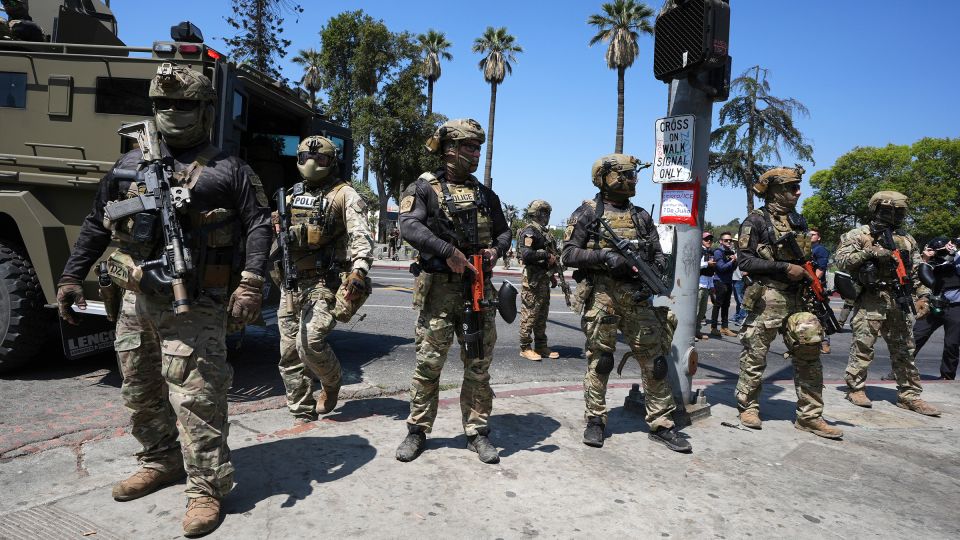Tensions Flare in Southern California Over Immigration Raids

Legal Restrictions on Immigration Raids in California
After weeks of intense immigration raids in public spaces and workplaces across Southern California, a federal judge has issued a temporary restraining order that limits the way federal authorities conduct immigration arrests. The ruling requires agents to have "reasonable suspicion" before making an arrest and prohibits using factors like race or speaking Spanish as the sole basis for detaining individuals.
The decision comes after a series of chaotic raids at legal marijuana farms in Ventura and Santa Barbara counties, where approximately 200 migrants were detained. The Department of Homeland Security (DHS) stated that these operations were based on criminal warrants, but conflicting accounts from workers and officials have raised concerns about the legality and conduct of the raids. Some reports suggest that during one of the raids, federal agents were shot at, though no suspect has been apprehended yet.
This situation has reignited tensions in a region that has become a focal point for large-scale immigration operations under the Trump administration. Protests against these actions have continued, often resulting in arrests of demonstrators themselves. In response, Los Angeles Mayor Karen Bass signed an executive order aimed at protecting immigrant communities and ensuring their rights are upheld.
Feds and Protesters Clash at Farms
Intense standoffs occurred during the raids at legal marijuana farms in Ventura and Santa Barbara counties. Federal immigration agents faced off against protesters who gathered in large numbers, some clad in military-style gear. During one raid, a person fired a gun at officers, leading to a tense standoff. Although no suspect has been caught, the incident highlights the growing friction between federal authorities and local communities.
President Donald Trump encouraged ICE and Homeland Security officials to take action against protesters who throw rocks or bricks at officers, urging them to use “whatever means is necessary.” This rhetoric has further escalated the conflict, with some critics arguing that it encourages excessive force.
Injuries and Concerns
Injuries were reported during the raids, with the United Farm Workers union stating that multiple farmworkers were critically injured during the Camarillo raid. One worker was hospitalized in critical condition, though the DHS clarified that he was not in custody at the time. The agency attributed his fall to an accident and claimed that emergency services were dispatched immediately.
During the Camarillo raid, vehicles from Border Patrol and Customs and Border Protection blocked roads, while military-style vehicles and a helicopter flew overhead. Protesters were met with smoke canisters, creating a volatile environment. Similar tensions were reported in Carpinteria, where smoke bombs were used during the raid.
Congressman Salud Carbajal, a Democrat representing the area, criticized the aggressive tactics used by ICE agents, calling the operation "overkill" and expressing concern over the fear and intimidation it caused. He also mentioned that a young child was hurt by shrapnel from the agents' devices.
Local Leaders Speak Out
Mayor Luis McArthur of Oxnard expressed concern over the impact of ICE operations on the community, stating that the actions were causing unnecessary distress and harm. He pledged to work with state officials to explore legal avenues to address these issues.
Meanwhile, White House border czar Tom Homan emphasized that while protests are allowed, any obstruction of federal operations would result in arrests. His comments reflect the administration's stance on maintaining control over immigration enforcement.
ICE Operations in L.A. Park
The raids occurred just days after federal immigration agents, along with members of the California National Guard, deployed to MacArthur Park in Los Angeles. The park, known for its large immigrant population, became the site of a protest as activists tried to drive out the agents. Mayor Karen Bass criticized the presence of armed vehicles in the park, calling it "outrageous and un-American."
Although no one was taken into custody during the operation, the incident sparked widespread concern about the use of military-style tactics in civilian areas. Bass later signed an executive directive to support immigrant communities, emphasizing the need to protect their rights and ensure transparency.
Judge Limits ICE Raids
U.S. District Judge Maame Ewusi-Mensah Frimpong issued a ruling that severely limits ICE raids in California’s central district. The order requires federal authorities to have reasonable suspicion before making an arrest and prohibits using race, ethnicity, or language as the sole basis for detention. It also mandates access to legal representation for detainees.
The lawsuit, filed by the ACLU of Southern California, alleges that the Trump administration has engaged in unconstitutional arrests and detentions to meet arbitrary quotas. The government argued that arrests were based on intelligence and trend analysis, but the judge found this claim insufficient.
Governor and Mayor Support the Ruling
Governor Gavin Newsom praised the ruling, calling it a step toward preventing racial profiling and protecting constitutional rights. Mayor Karen Bass also supported the decision, stating it was an important step in restoring safety and defending the rights of all residents.
Bass has taken additional steps to strengthen the city’s response to immigration raids. She instructed city departments to prepare plans for how to respond if federal agents attempt to detain migrants on city property. A task force will also be formed to discuss ways to support impacted residents.
Calls for Transparency
The city has requested records from the federal government regarding the dates and locations of immigration operations, which have largely been unannounced. This move reflects growing concerns about the lack of transparency and accountability in federal immigration enforcement.
As the situation continues to unfold, the balance between immigration enforcement and civil liberties remains a contentious issue. With ongoing legal challenges and public protests, the future of immigration policy in California remains uncertain.
Post a Comment for "Tensions Flare in Southern California Over Immigration Raids"
Post a Comment